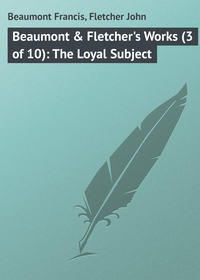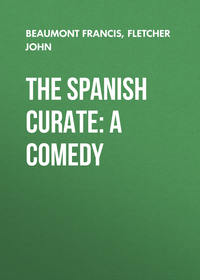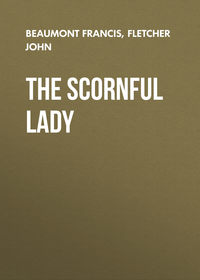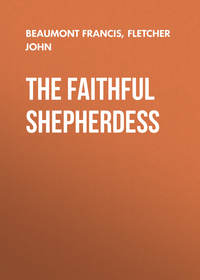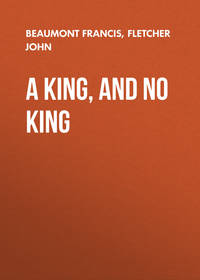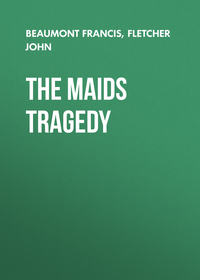Полная версия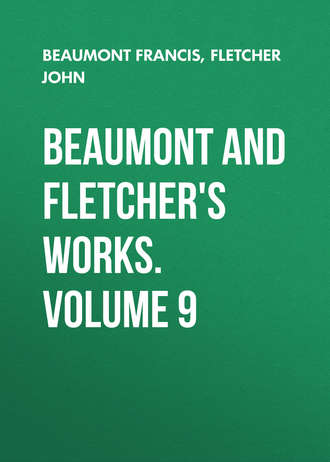
Купить и скачать
Добавить В библиотеку
Beaumont and Fletcher's Works. Volume 9
Настройки чтения
Размер шрифта
Высота строк
Поля
Scæna Tertia
Enter Jailor, Wooer, DoctorDoct. Her distraction is more at some time of the Moon,Than at other some, is it not?Jay. She is continually in a harmless distemper, sleepsLittle, altogether without appetite, save often drinking,Dreaming of another world, and a better; and whatBroken piece of matter so e'er she's about, the namePalamon lards it, that she farces ev'ry businessEnter DaughterWithal, fits it to every question; Look whereShe comes, you shall perceive her behaviour.Daugh. I have forgot it quite; the burden on't was DownA down a: and penn'd by no worse man, thanGiraldo, Emilias Schoolmaster; he's asFantastical too, as ever he may goe upon's legs,For in the next world will Dido see Palamon, andThen will she be out of love with Æneas.Doct. What stuff's here? poor soul.Jay. Ev'n thus all day long.Daugh. Now for this Charm, that I told you of, you mustBring a piece of silver on the tip of your tongue,Or no ferry: then if it be your chance to come whereThe blessed spirits, as there's a sight now; we MaidsThat have our Livers, perisht, crackt to pieces withLove, we shall come there, and do nothing all day longBut pick Flowers with Proserpine, then will I makePalamon a Nosegay, then let him mark me, – then.Doct. How prettily she's amiss! note her a little farther.Da[u]. Faith I'll tell you, sometime we goe to Barly-break,We of the blessed; alas, 'tis a sore life they have i' th'Other place, such burning, frying, boiling, hissing,Howling, chatt'ring, cursing, oh they have shrowdMeasure, take heed; if one be mad, or hang, orDrown themselves, thither they goe, Jupiter blessUs, and there shall we be put in a Cauldron ofLead, and Usurers grease, amongst a whole million ofCut-purses, and there boil like a Gamon of BaconThat will never be enough.[Exit.Doct. How her brain coins!Daugh. Lords and Courtiers, that have got Maids with child, they are in this place, they shall stand in fire up to the Navel, and in Ice up to th' heart, and there th' offending part burns, and the deceiving part freezes; in troth a very grievous punishment, as one would think, for such a Trifle, believe me one would marry a leprous witch, to be rid on't I'll assure you.Doct. How she continues this fancie! 'Tis not an engraffed madness but a most thick, and profound melancholly.Daugh. To hear there a proud Lady, and a proud City wife, howl together: I were a beast, and Il'd call it good sport: one cries, oh this smoak, another this fire; one cries oh that I ever did it behind the Arras, and then howls; th' other curses a suing fellow and her Garden-house.Sings. I will be true, my Stars, my Fate, &c.[Exit Daugh.Jay. What think you of her, Sir?Doct. I think she has a perturbed mind, which I cannot minister to.Jay. Alas, what then?Doct. Understand you, she ever affected any man, e'rShe beheld Palamon?Jay. I was once, Sir, in great hope she had fix'd herLiking on this Gentleman my friend.Woo. I did think so too, and would account I had a greatPen'worth on't, to give half my state, that bothShe and I at this present stood unfainedly on theSame terms.Doct. That intemperate surfet of her eye, hath distemper'd theOther sences, they may return and settle again toExecute their preordained faculties, but they areNow in a most extravagant vagary. This youMust doe, confine her to a place, where the lightMay rather seem to steal in, than be permitted; takeUpon you (young Sir, her friend) the name ofPalamon; say you come to eat with her, and toCommune of Love; this will catch her attention, forThis her mind beats upon; other objects that areInserted 'tween her mind and eye, become the pranksAnd friskins of her madness; sing to her such greenSongs of Love, as she says Palamon hath sung inPrison; Come to her, stuck in as sweet Flowers as theSeason is mistriss of, and thereto make an addition ofSome other compounded odors, which are grateful to theSense: all this shall become Palamon, for Palamon canSing, and Palamon is sweet, and ev'ry good thing, desireTo eat with her, carve her, drink to her, and stillAmong, intermingle your petition of grace and acceptanceInto her favour: learn what Maids have been herCompanions, and Play-pheers; and let them repair toHer with Palamon in their mouths, and appear withTokens, as if they suggested for him, it is a falshoodShe is in, which is with falshoods to be combated.This may bring her to eat, to sleep, and reduce what'sNow out of square in her, into their former Law, andRegiment; I have seen it approved, how many timesI know not, but to make the number more, I haveGreat hope in this. I will between the passages ofThis project, come in with my applyance: Let usPut it in execution; and hasten the success, which doubt notWill bring forth comfort.[Florish. Exeunt.Actus Quintus. Scæna Prima
Scæna Secunda
Enter Doctor, Jaylor, and Woo[e]r, in habit of PalamonDoct. Has this advice I told you, done any good upon her?Woo. Oh very much; the Maids that kept her companyHave half perswaded her that I am Palamon; within thisHalf hour she came smiling to me, and ask'd me what IWould eat, and when I would kiss her: I told her,Presently, and kist her twice.Doct. 'Twas well done; twenty times had been far better,For there the cure lies mainly.Woo. Then she told meShe would watch with me to night, for well she knewWhat hour my fit would take me.Doct. Let her do so,And when your fit comes, fit her home,And presently.Wooer. She would have me sing.Doct. You did so?Woo. No.Doct. 'Twas very ill done then,You should observe her ev'ry way.Woo. AlasI have no voice Sir, to confirm her that way.Doct. That's all one, if ye make a noise,If she intreat again, do any thing,Lie with her if she ask you.Jail. Hoa there Doctor.Doct. Yes, in the way of cure.Jail. But first, by your leaveI' th' way of honesty.Doct. That's but a niceness,Nev'r cast your child away for honesty;Cure her first this way, then if she will be honest,She has the path before her.Jail. Thank ye Doctor.Doct. Pray bring her inAnd let's see how she is.Jail. I will, and tell herHer Palamon staies for her: but Doctor,Methinks you are i' th' wrong still.[Exit Jaylor.Doct. Goe, goe: you Fathers are fine fools: her honesty?And we should give her physick till we find that:Woo. Why, do you think she is not honest, Sir?Doct. How old is she?Woo. She's eighteen.Doct. She may be,But that's all one, 'tis nothing to our purpose,What ev'r her Father saies, if you perceiveHer Mood inclining that way that I spoke ofVidelicet, The way of flesh, you have me.Woo. Yes very well Sir.Doct. Please her appetiteAnd do it home, it cures her ipso facto,The melancholly humor that infects her.Woo. I am of your mind, Doctor.Enter Jailor, Daughter, MaidDoct. You'll find it so; she comes, pray honor her.Jail. Come, your Love Palamon stays for you child,And has done this long hour, to visit you.Daugh. I thank him for his gentle patience,He's a kind Gentleman, and I am much bound to him,Did you never see the horse he gave me?Jail. Yes.Daugh. How do you like him?Jail. He's a very fair one.Daugh. You never saw him dance?Jail. No.Daugh. I have often,He dances very finely, very comely,And for a Jigg, come cut and long tail to him,He turns ye like a Top.Jail. That's fine indeed.Daugh. He'll dance the Morris twenty mile an hour.And that will founder the best hobby-horse(If I have any skill) in all the parish,And gallops to the turn of Light a'love,What think you of this horse?Jail. Having these virtuesI think he might be brought to play at Tennis.Daugh. Alas that's nothing.Jail. Can he write and read too?Daugh. A very fair hand, and casts himself th' accountsOf all his Hay and Provender: that HostlerMust rise betime that cozens him; you knowThe Chesnut Mare the Duke has?Jail. Very well.Daugh. She is horribly in love with him, poor beast,But he is like his Master, coy and scornful.Jail. What Dowry has she?Daugh. Some two hundred Bottles,And twenty strike of Oats; but he'll ne'er have her;He lisps, in's neighing, able to enticeA Millers Mare,He'll be the death of her.Doct. What stuff she utters!Jail. Make curt'sie, here your love comes.Woo. Pretty soulHow doe ye? that's a fine Maid, there's a curt'sie.Daugh. Yours to command i'th' way of honesty;How far is't now to th' end o'th' world my Masters?Doct. Why a days journey wench.Daugh. Will you go with me?Woo. What shall we do there wench?Daugh. Why play at Stool-ball.What is there else to do?Woo. I am contentIf we shall keep our wedding there.Daugh. 'Tis trueFor there I will assure you, we shall findSome blind Priest for the purpose, that will ventureTo marry us, for here they are nice and foolish;Besides, my Father must be hang'd to morrowAnd that would be a blot i'th' business.Are not you Palamon?Woo. Do not you know me?Daugh. Yes, but you care not for me; I have nothingBut this poor Petticoat, and two course Smocks.Woo. That's all one, I will have you.Daugh. Will you surely?Woo. Yes, by this fair hand will I.Daugh. We'll to bed then.Woo. Ev'n when you will.Daugh. Oh Sir, you would fain [b]e nibling.Woo. Why do you rub my kiss off?Daugh. 'Tis a sweet one,And will perfume me finely against the wedding.Is not this your Cosin Arcite?Doct. Yes Sweet heart,And I am glad my Cosin PalamonHas made so fair a choice.Daugh. Do you think he'll have me?Doct. Yes without doubt.Daugh. Do you think so too?Jail. Yes.Daugh. We shall have many children: Lord, how y'are [growne]My Palamon I hope will grow too finelyNow he's at liberty: alas poor Chicken,He was kept down with hard Meat, and ill Lodging,But I'll kiss him up again.Enter a MessengerMess. What do you here? you'll lose the noblest sight,That e'er was see[ne].Jail. Are they i'th' field?Mess. They areYou bear a charge there too.Jail. I'll away straightI must ev'n leave you here.Doct. Nay, we'll goe with you,I will not loose the Fight.Jail. How did you like her?Doct. I'll warrant you within these three or four daysI'll make her right again. You must not from herBut still preserve her in this way.Woo. I will.Doct. Let's get her in.Woo. Come Sweet, we'll go to dinnerAnd then we'll play at Cards.Daugh. And shall we kiss too?Woo. A hundred times.Daugh. And twenty.Woo. I, and twenty.Daugh. And then we'll sleep together.Doct. Take her offer.Woo. Yes marry will we.Daugh. But you shall not hurt me.Woo. I will not Sweet.Daugh. If you do (Love) I'll cry.[Florish Exeunt.Scæna Tertia
Enter Theseus, Hippolita, Emilia, Perithous: and some Attendants, T. Tuck: CurtisEmil. I'll no step further.Per. Will you loose this sight?Emil. I had rather see a Wren hawk at a FlyThan this decision; ev'ry blow that fallsThreats a brave life, each stroke lamentsThe place wheron it falls, and sounds more likeA Bell, than Blade, I will stay here,It is enough, my hearing shall be punish'd,With what shall happen, 'gainst the which there isNo deafing, but to hear; not taint mine eyeWith dread sights, it may shun.Per. Sir, my good LordYour Sister will no further.Thes. Oh she must.She shall see deeds of Honor in their kind,Which sometime shew well pencill'd. Nature nowShall make, and act the Story, the beliefBoth seal'd with eye, and ear; you must be present,You are the victors meed, the price, and garlandTo crown the Questions Title.Emil. Pardon me,If I were there, I'd wink.Thes. You must be there;This trial is as 'twere i' th' night, and youThe only Star to shine.Emil. I am extinct,There is but envy in that light, which showsThe one the other: darkness which ever wasThe [dam] of horror; who does stand accurstOf many mortal Millions, may even nowBy casting her black mantle over bothThat neither could find other, get her selfSome part of a good name, and many a murtherSet off whereto she's guilty.Hip. You must go.Emil. In faith I will not.Thes. Why the Knights must kindleTheir valour at your eye: know of this warYou are the Treasure, and must needs be byTo give the Service pay.Emil. Sir, pardon me,The Title of a Kingdom may be try'dOut of it self.Thes. Well, well then, at your pleasure,Those that remain with you, could wish their officeTo any of their enemies.Hip. Farewel Sister,I am like to know your Husband 'fore your selfBy some small start of time, he whom the godsDoe of the two, know best, I pray them, heBe made your Lot.[E[xeunt] Theseus, Hippolita, Perithous, &c.Emil. Arcite is gently visag'd; yet his eyeIs like an Engine bent, or a sharp weaponIn a soft sheath; mercy, and manly courageAre bedfellows in his visage: PalamonHas a most menacing aspect, his browIs grav'd, and seems to bury what it frowns on,Yet sometimes 'tis not so, but alters toThe quality of his thoughts; long time his eyeWill dwell upon his object. MelanchollyBecomes him nobly; so does Arcite's mirth,But Palamon's sadness is a kind of mirth,So mingled, as if mirth did make him sad.And sadness, merry; those darker humors thatStick mis-becomingly on others, on themLive in fair dwelling.[Cornets. Trumpets sound as to a Charge.Hark how yo[n] spurs to spirit doe inciteThe Princes to their proof, Arcite may win me,And yet may Palamon wound Arcite, toThe spoiling of his figure. Oh what pityEnough for such a chance; if I were byI might do hurt, for they would glance their eiesToward my Seat, and in that motion mightOmit a Ward, or forfeit an offenceWhich crav'd that very time: it is much better[Cornets. A great cry, and noise within, crying a Palamon.I am not there, oh better never bornThan minister to such harm, what is the chance?Enter ServantSer. The cry's a Palamon.Emil. Then he has won: 'twas ever likely,He look'd all grace and success, and he isDoubtless the prim'st of men: I prethee runAnd tell me how it goes.[Shout, and Cornets: crying a Palamon.Ser. Still Palamon.Emil. Run and enquire, poor Servant thou hast lost,Upon my right side still I wore thy Picture,Palamon's on the left, why so I know not,I had no end in't; else chance would have it so.[Another cry and shout within, and Cornets.On the sinister side the heart lies; PalamonHad the best boding chance: this burst of clamorIs sure th' end o'th' combat.Enter ServantSer. They said that Palamon had Arcites bodyWithin an inch o'th' Pyramid, that the cryWas general a Palamon: but anon,Th' Assistants made a brave redemption, andThe two bold Tytlers, at this instant areHand to hand at it.Emil. Were they metamorphos'dBoth into one; oh why? there were no womanWorth so compos'd a man: their single share,[Their noblenes peculier to them, gives]The prejudice of disparity values shortness[Cornets. Cry within, Arcite, Arcite.To any Lady breathing – More exulting?Palamon still?Ser. Nay, now the sound is Arcite.Emil. I prethee lay attention to the Cry.[Cornets. A great shout, and cry, Arcite, victory.Set both thine ears to th' business.Ser. The cry isArcite, and victory, hark Arcite, victory,The Combats consummation is proclaim'dBy the wind Instruments.Emil. Half sights sawThat Arcite was no babe, god's lyd, his richnessAnd costliness of spirit lookt through him; it couldNo more be hid in him, than fire in flax,Than humble banks can go to law with waters,That drift winds, force to raging: I did thinkGood Palamon would miscarry, yet I knew notWhy I did think so; Our reasons are not prophetsWhen oft our fancies are: they are coming off:Alas poor Palamon.[Cornets. Enter Theseus, Hippolita, Perithous, Arcite as Victor and Attendants, &cThes. Lo, where our Sister is in expectation,Yet quaking, and unsetled: fairest Emilia,The gods by their Divine arbitramentHave given you this Knight, he is a good oneAs ever struck at head: Give me your hands;Receive you her, you him, be plighted withA love that grows, as you decay.Arcite. Emily.To buy you I have lost what's dearest to me,Save what is bought, and yet I purchase cheaply,As I do rate your value.Thes. Oh loved Sister,He speaks now of as brave a Knight as e'erDid spur a noble Steed: surely the godsWould have him die a batchelor, lest his raceShould show i'th' world too godlike: his behaviourSo charm'd me, that methought Alcides wasTo him a Sow of Lead: if I could praiseEach part of him to th' all I have spoke, your ArciteDid not lose by't; for he that was thus goodEncountred yet his Better, I have heardTwo emulous Philomels, beat the ear o'th' nightWith their contentious throats, now on[e] the higher,Anon the other, then again the first,And by and by out-breasted, that the senseCould not be judge between 'em: so it far'dGood space between these kinsmen; till heavens didMake hardly one the winner: wear the GarlandWith joy that you have won: for the subdu'd,Give them our present Justice, since I knowTheir lives but pinch 'em, let it here be done:The Scene's not for our seeing, goe we hence,Right joyful, with some sorrow. Arm your prize,I know you will not lose her: HippolitaI see one eye of yours conceives a tearThe which it will deliver.[Florish.Emil. Is this winning?Oh all you heavenly powers, where is your mercy?But that your wills have said it must be so,And charge me live to comfort this unfriended,This miserable Prince that cuts awayA life more worthy from him, than all women;I should, and would die too.Hip. Infinite pityThat four such eyes should be so fix'd on oneThat two must needs be blind for't.Thes. So it is.[Exeunt.

